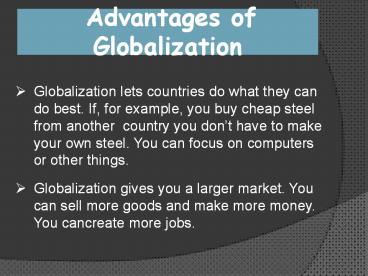Advantage and Disadvantage of Globalization PowerPoint PPT Presentation
Title: Advantage and Disadvantage of Globalization
1
Advantages of Globalization
- Globalization lets countries do what they can do
best. If, for example, you buy cheap steel from
another country you dont have to make your own
steel. You can focus on computers or other
things. - Globalization gives you a larger market. You can
sell more goods and make more money. You
cancreate more jobs.
2
gt The best of cultures can be shared and
understood on a global scale.gt Employees of a
transnational corporation may be well paid
compared to other workers in the country.gt
Since we share financial interests, corporate.
- Consumers also profit from globalization.
Products become cheaper and you can get new goods
more quickly.
3
- Global mass media ties the world together.
- Increased flow of communications allows vital
information to be shared between individuals and
corporations around the world. - Greater ease and speed of transportation for
goods and people.
4
- Reduction of cultural barriers increases the
global village effect. - Spread of democratic ideals to developed nations.
- Greater interdependence of nation-states.
- Reduction of likelihood of war between developed
nations. - Increases in environmental protection in
developed nations.
5
- Movement of Labor
Benefit of globalization is the free movement of
labor. In a globalized world, workers can more
easily move from one country to another to market
their skills to employers and contribute to the
economy. In many cases, free movement of labor
allows economies to fix gaps that exist in
their labor markets. For example, the United
Kingdom has hired nurses from India and many
different countries to fill positions in its
public hospitals that were previously empty due
to local labor shortages.
6
- Free Trade
- Free trade reduces the barriers that once stood
between nations trading freely with one another.
When companies in different nations dont face
any barriers to trade in the form of import or
export restrictions, they can engage in free
trade. - An example of a free trade agreement is the North
American Free Trade Agreement (NAFTA), which
allows Mexico, Canada, and the United States to
exchange products and services without
significant import and export restrictions
PowerShow.com is a leading presentation sharing website. It has millions of presentations already uploaded and available with 1,000s more being uploaded by its users every day. Whatever your area of interest, here you’ll be able to find and view presentations you’ll love and possibly download. And, best of all, it is completely free and easy to use.
You might even have a presentation you’d like to share with others. If so, just upload it to PowerShow.com. We’ll convert it to an HTML5 slideshow that includes all the media types you’ve already added: audio, video, music, pictures, animations and transition effects. Then you can share it with your target audience as well as PowerShow.com’s millions of monthly visitors. And, again, it’s all free.
About the Developers
PowerShow.com is brought to you by CrystalGraphics, the award-winning developer and market-leading publisher of rich-media enhancement products for presentations. Our product offerings include millions of PowerPoint templates, diagrams, animated 3D characters and more.

